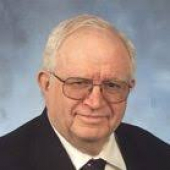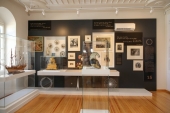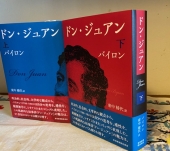Prof. Frederick Burwick passed away on the morning of March 16, one day before his 86th birthday. He touched many lives with his depth of his knowledge on writers ranging from Coleridge, Byron, Wordsworth, and Blake, but he was never too busy to offer a helping hand to students, to write cheerful posts during the Pandemic, and to mentor colleagues who benefited from his warmth, spirit, and encouragement. He will be greatly missed.
Fred gave a keynote lecture at the superbly organized IABS conference in Gdansk, Poland, which appears in Byron: Reality, Fiction and Madness, edited by Miroslawa Modrzewska and Maria Fengler. A recent lecture on Byron's "Manfred" can be found here: https://romantic-circles.org/praxis/manfred/praxis.2019.manfred.burwick.html
We are very sad to announce the passing of John Clubbe, former president of the IABS and the Byron Society of America for many years. John Clubbe died on February 24, just a few days after his 84th birthday.
He was Professor Emeritus at the University of Kentucky and taught at Duke University for many years. Anyone who attended an IABS conference experienced his warmth, intelligence, and wide-ranging lectures on inter-disciplinary subjects. With Joan Blythe, who helped him run the IABS with great aplomb, he shared his erudition in conferences all over the world, including Tokyo, Salzburg, Beirut, and Tbilisi, to name only a few. He gave the Leslie Marchand lecture on Byron and Beethoven, the subject of his last and widely reviewed book with Norton, which has sold over 3500 copies. Many will wish to share their memories of this kind and supportive scholar, who brought scholars into the study of Romanticism and Lord Byron. A fuller notice of his career will follow in due course.
On 27 June 2021, the inauguration of the of the Messolonghi Byron Society’s Museum for Lord Byron and Philhellenism, took place.
In the inaugural exhibition the National Historical Museum, in collaboration with the Byron Society of the Sacred City of Messolonghi, presents a flashback to the Greek Revolution 1821 with emphasis on the events that took place in Western Central Greece.
The exhibition is called: "Revolution '21 Reframed".
On the 3rd of December, 2021, Professor Itsuyo Higashinaka published the Japanese edition (translation) of Lord Byron’s Don Juan in two volumes comprising 1,092 pages.
He began his intensive reading, research, and translation of Don Juan at the turn of century. After about twenty years of hard work, the translation, which include enlightening notes, was published by Mr. Takashi Yamaguchi, president of Otowashoboh-Tsurumi Shoten, in Tokyo, Japan. Besides the outstanding translations of Byron’s seventeen cantos, Professor Higashinaka inserted relevant illustrations in the first volume; and in the second, he appended a Byron chronology and summaries of the cantos.
We, all members of the Japanese Byron Society, believe that this work is a culmination of Byron studies in Japan. We are absolutely confident that his unprecedented Japanese translation of Don Juan will promote Byron studies among younger generations in our country.
Michael Rees (Brother Teilo) was joint chairman (with Ian Scott-Kilvert) of the The Byron Society from May 1975 until the close of 1978, succeeding the late Dennis Walwin Jones. He also served as the first secretary, later joint chair, of the International Byron Society, encouraging the development of many of the international societies and organizing a number of the early international tours, including Scotland and Greece in 1976,
Portugal and Spain in 1977, and Italy in 1978, among others. A gifted linguist, he sometimes served as an unofficial interpreter on the tours. He translated Teresa Guiccioli’s Vie de Lord Byron en Italie (University of Delaware Press, 2005), which was edited by Peter Cochran. A dedicated collector of Byron books in many languages, as well as Byronic portraits and memorabilia, he generously donated his entire remarkable collection to help launch the Byron Society Collection as he was preparing to enter the abbey at Caldey Island. A very kind person, Michael was a peacemaker; every person that he met was important to him. His impact on the International Byron Society remains immeasurable.





